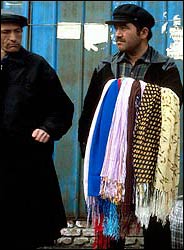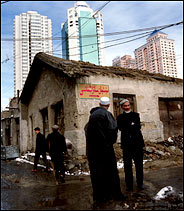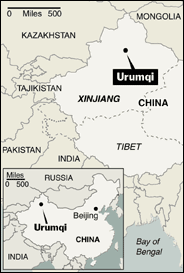|
On Old Silk Road,
Condos, Mosques and Ethnic Tensions
 Stuart
Isett/Polaris, for The New York Times Stuart
Isett/Polaris, for The New York Times
In Urumqi, the capital of Xinjiang, Uighur peddlers
sold their wares at the Erdaoqiao
By HOWARD W. FRENCH
Published: March 16, 2004
RUMQI, China, March 12 ¡ª On a big public square
dominated by this city's huge gold-domed theater,
taxis honk their way through slushy, chaotic streets,
stopping to take on passengers laden with bundles of
walnuts, almonds, dates and dried plums purchased at
open stalls.
Others disembark to pray at one of a score of mosques
that dot the inner city, walking past vendors' tables
displaying DVD's with Arabic titles about the Persian
Gulf war of 1991.
The sidewalk diners at a nearby restaurant, biting
away at heavily spiced skewers of lamb kebab and
tucking into bowls of meaty stew, seem as though they
could have been chosen by casually throwing darts at a
map of Asia.
There are alluringly dressed women with black hair,
fair skin and striking blue eyes who look passably
Russian. There are men with heavily lined, tea-colored
faces and brush-thick mustaches who resemble Afghans.
There are Turkish-looking Uighurs in Muslim skullcaps
and robes and mid-length beards.
 Most
are probably Chinese, though ¡ª no less than members
of the ethnic Chinese majority known as the Han, some
of whom, looking businesslike, are filing into a
pedestrian underpass nearby. Most
are probably Chinese, though ¡ª no less than members
of the ethnic Chinese majority known as the Han, some
of whom, looking businesslike, are filing into a
pedestrian underpass nearby.
"You've got to be able to speak a little bit of a lot
of languages in this work," said Ahat Imam, a burly,
dark-skinned man who operates a bank of telephones on
the sidewalk, where people call places throughout
China as well as the farthest corners of Central Asia.
"I can speak Uighur, a little Kazakh, a little Uzbek.
And when I see a customer, right away I can tell what
ethnic group he is from."
 To
visit a city like this, the capital of China's far
western region of Xinjiang, is to be powerfully
reminded that this country is very much a work in
progress, a place where the center does not always
hold. To
visit a city like this, the capital of China's far
western region of Xinjiang, is to be powerfully
reminded that this country is very much a work in
progress, a place where the center does not always
hold.
Xinjiang's independence movements enjoy little of the
sympathy in the West that neighboring Tibet receives.
But this remote region, nearly as far from Beijing as
California is from Washington ¡ª along with Hong Kong
and, some would add, Taiwan ¡ª is every bit as much a
part of forces that are tearing at this country, much
as the former Soviet Union was sundered and as China
has been divided in the past.
China is hastily redeveloping this frontier capital.
Sparkling office buildings and high-rise condos now
rise from streets that were dominated only a decade
ago by blocky, artless compounds dating from the
Cultural Revolution of 1966-76.
The rise of a new Urumqi (pronounced oo-ROOM-chee),
though, has barely papered over the ethnic and
religious cracks that run deep in this region, which
sits astride the ancient Silk Road. Islam reigned here
for 1,000 years, but it is under heavy pressure from
ethnic Chinese migration, breakneck development and
heavy-handed repression.
In today's Xinjiang, money, authority, power ¡ª and,
many Uighurs say, hope too ¡ª are all firmly in the
grasp of the ethnic Chinese, who arrive from poorer
areas of the country by the thousands every day to
seek their fortunes.
The restive Uighurs, a Central Asian ethnic group
common to this part of China and to the neighboring
former Soviet republics, are becoming an increasingly
voiceless minority in their own homeland.
Since the Sept. 11 attacks in the United States, China
has justified many of its policies in Xinjiang as part
of its own war on terror. Indeed, the Bush
administration has added Uighur separatist groups to
its lists of international terrorist organizations.
But the campaign of repression here, international
human rights experts say, has far older roots.
Scores of mosques have been razed and Uighur
literature burned. There have been forced "re-education"
campaigns of local religious leaders, many arrests of
people suspected of being separatists, and numerous
executions.
This region twice briefly enjoyed independence from
China in the 1930's and 1940's. Its dream of
self-determination was rekindled by the end of the
Soviet Union, when ethnic kinsmen in neighboring
republics, like Kazakhstan and Tajikistan, were given
independence.
Uighur demonstrations were put down with increasing
ferocity by the government, prompting ever bolder
actions by pro-independence groups.
The government has heavily reinforced security
throughout the province, reportedly installing hidden
cameras inside mosques and stepping up its
surveillance of students and others. Koranic schools
have been closed, and civil servants, teachers and
students have reportedly been forbidden to pray in
public.
Mickey Spiegel, a China expert at Human Rights Watch
in New York, said it was known that people had been
jailed for separatist activities. "The number of
executions is not known," she said. "I must say that
the information that is coming out of Xinjiang is
tighter than it has ever been."
Understandably, people in Urumqi speak guardedly with
strangers. "We give religious education to our
children at home," said Wang Yanqing, 53, a watchman
at a blue-tile-roofed Qing Dynasty mosque. "Islam is
not available in schools."
In one almost entirely Uighur neighborhood near the
center of town, on a frigid morning this week, Islamic
music rang out from an unseen sound box, and a cluster
of men danced playfully on a terrace.
Down the street, Tohti Hapiz, a Uighur blacksmith,
pulled red-hot iron bars from a crude street furnace
and beat them into meat cleavers with the help of two
apprentices. He said each would sell for about a
dollar.
Mr. Hapiz paused in reflection when asked what Urumqi
would be like in 20 years. "Uighurs don't have much to
do here, besides standing, smoking cigarettes,
drinking and selling things," he answered. "We are as
clever as the Han, but more and more this is becoming
their city. Meanwhile, the prisons are full of Uighurs."
|



 Stuart
Isett/Polaris, for The New York Times
Stuart
Isett/Polaris, for The New York Times Most
are probably Chinese, though ¡ª no less than members
of the ethnic Chinese majority known as the Han, some
of whom, looking businesslike, are filing into a
pedestrian underpass nearby.
Most
are probably Chinese, though ¡ª no less than members
of the ethnic Chinese majority known as the Han, some
of whom, looking businesslike, are filing into a
pedestrian underpass nearby. To
visit a city like this, the capital of China's far
western region of Xinjiang, is to be powerfully
reminded that this country is very much a work in
progress, a place where the center does not always
hold.
To
visit a city like this, the capital of China's far
western region of Xinjiang, is to be powerfully
reminded that this country is very much a work in
progress, a place where the center does not always
hold.